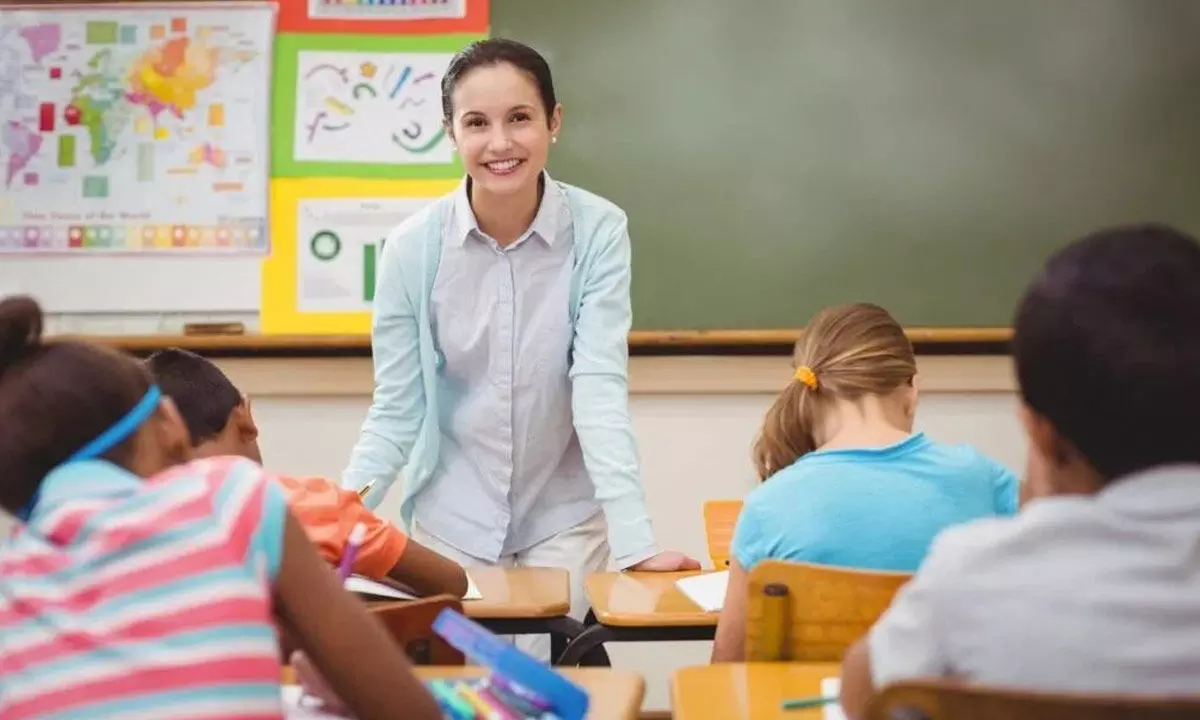Live
- Scientists Provide Training to Farmers on Integrated Farming
- SP Gaikwad Launches Feedback QR Code Poster for Police Services Opinion
- Helping Hands Charitable Trust Distributes Study Material to 3,000 Students in Gattu Mandal
- Samajwadi Party Strengthens Leadership in Telangana and Andhra Pradesh
- Poco X7 5G and Poco X7 Pro 5G Launched in India: Price, Specifications, and Features
- Congress Party Demands Amit Shah's Apology and Resignation Over Comments on Dr. B.R. Ambedkar
- Aero India 2025: Rajnath Singh to chair envoys’ round-table tomorrow
- Operation Smile-11 and Poshan Abhiyaan: Initiatives to Rescue Children and Promote Health in the District
- Tirupati Stampede Incident: Deputy CM Pawan Kalyan Apologizes and Calls for TTD Purge
- Director Bobby and Thaman S Focus on Delivering a Festive Treat with Daaku Maharaaj
Just In
A look at how educators are transforming the future of education


As we celebrate Teachers’ Day, it’s an opportune moment to reflect on the evolving landscape of education and the pivotal role educators play in shaping the future.
As we celebrate Teachers’ Day, it’s an opportune moment to reflect on the evolving landscape of education and the pivotal role educators play in shaping the future. With rapid technological advancements and changing global needs, the education sector is undergoing a significant transformation, and at the forefront of this change are the dedicated teachers and institutions embracing innovation to prepare students for tomorrow’s challenges. We are witnessing a hybrid model of education that combines the best of traditional and digital learning methodologies.
Moreover, the skills required for success in the 21st century are vastly different from those of previous generations. Critical thinking, creativity, digital literacy, and adaptability are now as important as traditional academic knowledge. Educators are tasked with not only teaching these skills but embodying them, constantly updating their own knowledge and methods to stay relevant in a fast-changing world.
The Digital Revolution in Education
The National Education Policy (NEP) 2020 has been a catalyst for change in India’s educational framework. Mr. Beas Dev Ralhan, CEO of Next Education, highlights the policy’s impact: “The NEP 2020’s emphasis on digital literacy and flexible learning paths has accelerated the adoption of online education, making it a cornerstone of the future of learning.”
This shift towards digital platforms is not just filling gaps but revolutionizing the entire educational experience. Ed-tech platforms are now central to delivering personalized, accessible, and inclusive education. “By leveraging technology, educators are now equipped to offer personalized learning experiences that cater to the diverse needs of students across the country,” Ralhan adds, emphasizing the creation of a more dynamic and adaptable education system. While embracing digital tools, educational institutions are also focusing on preparing students for the evolving needs of industry. Prof. (Dr.) Preeti Bajaj, Director General of KIET Group of Institutions, emphasizes the importance of this approach: “Educators today are tasked with preparing students not just for the jobs of today, but for the challenges and opportunities of the future. This requires a delicate balance of fostering critical thinking, nurturing creativity, and embracing technological innovation.”
The focus is increasingly on creating adaptable, skilled professionals who can meet the demands of a rapidly changing job market. “Through industry collaborations and personalized learning experiences, we’re aiming to shape a generation of professionals who are not only technically proficient but also adaptable and empathetic,” Dr. Bajaj notes. This approach aligns with the concept of Education 5.0, which emphasizes the integration of technology with human-centric skills.
The Rise of Online Education
The flexibility offered by online education has been a game-changer for both students and educators. Pratham Barot, CEO & Co-Founder of Zell Education, observes, “Online education has revolutionized the traditional learning landscape by offering both students and educators the flexibility to tailor their experiences to individual needs and schedules.”
This digital transformation is not just about convenience; it’s about empowerment. Barot explains, “We believe that this evolution not only empowers learners but also allows educators to innovate with personalized teaching methods, ensuring each student reaches their full potential.” Teachers are not just educators but innovators, mentors, and guides helping to navigate the complex future that awaits their students. The future of education is being shaped by a blend of technology, personalization, and a renewed focus on critical thinking and creativity. As institutions and educators continue to adapt and innovate, they are ensuring that the next generation is well-equipped to face the challenges of tomorrow, creating a brighter and more sustainable future for all.

© 2025 Hyderabad Media House Limited/The Hans India. All rights reserved. Powered by hocalwire.com






